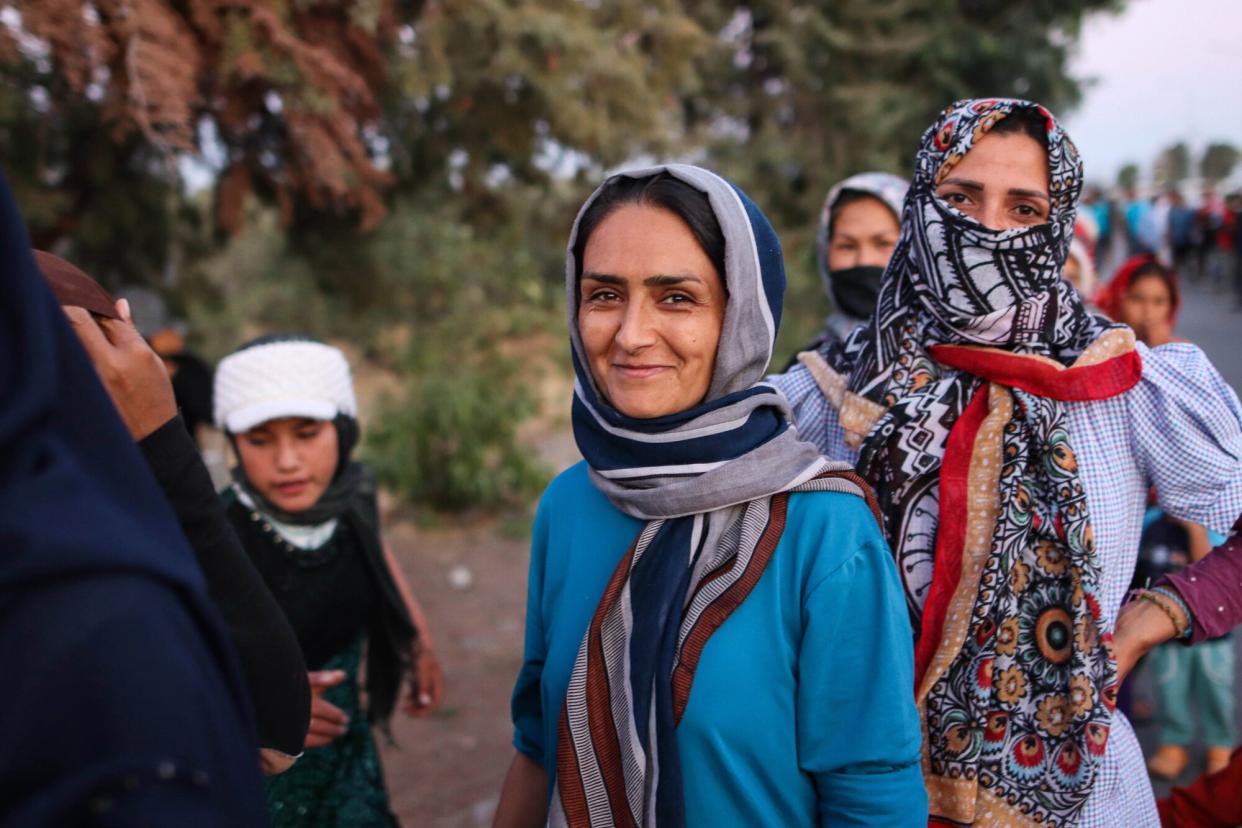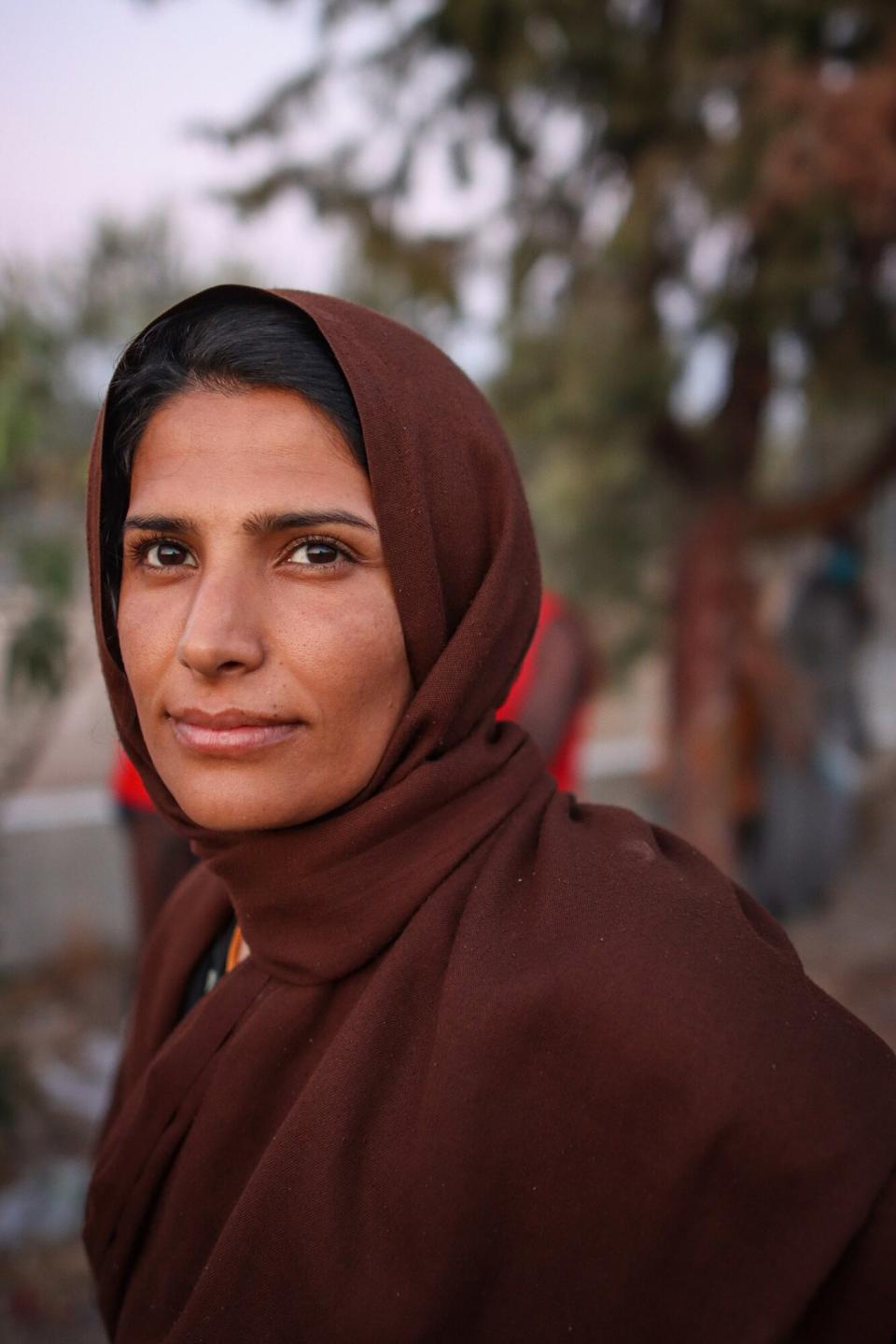If You Want to Help the Women of Afghanistan, Here's What You Need to Know First

NurPhoto/Getty
The images inundating social media were harrowing: Afghan men and boys clinging to a US aircraft taking off from the airport in Kabul. The desperation was palpable and it almost looked staged. But this event is not staged, it is happening in real time in Afghanistan.
What we did not see in those images were women and children: the most vulnerable of the population. Very often when we witness injustices, there is a deep sense of sadness, anger and helplessnes for those of us so far away. We cannot understand what we don't see; or we don't know how we could possibly help. That hopelessness allows for inaction, which we shouldn't accept.
My mother's family is from Paghman (just outside of Kabul) but settled in Peshawar, Pakistan. She often tells me stories about visiting Herat, Ghazni, Kandahar and other gorgeous places. I developed a strong attachment to that land. Though I have never stepped inside, I have peered over the border at the Kyber Pass in Pakistan.
Reading recent testimonies and words by terrified Afghan women journalists and frustrated athletes has been devastating. As a sports journalist and activist, I know the impacts that Taliban rule will have on women's access to sport, education, mobility — their sources of stability, yes, but also joy.
This is not how it's always been. There are beautiful stories of orchestras of girls and women playing music despite objections. There was joy and engagement in society, and possibilities of advancement for women at all levels in many fields.
Another distressing element of this story is the way in which Afghan and Muslim women are discussed online. The narratives are limited and ignorant. They conflate Islam with extremism, or suggest the entire conflict comes down to burkas when issues like displacement, separation of families, hunger, poverty, militarization and the traumas associated with invasion must be considered.
These opinions are reductive. They lack nuance and are marinated in white saviorism with a dash of imperialism for good measure. If one wants to 'help' women in Afghanistan, acknowledging them would be an important first step.
Been thinking of this photo of the Afghanistan women cricketers from last year.
In November the Afghanistan Cricket Board pledged to award central contracts to 25 female cricketers. A skills-and-fitness camp was organised in Kabul; a women's national team was to be formed. pic.twitter.com/gyKPFYjZR8— Annesha Ghosh (@ghosh_annesha) August 16, 2021
In my work, I have covered stories about women in Afghanistan, their challenges and their traumas. I have interviewed incredible Afghan women in sports, including pro soccer player Nadia Nadim and the International Olympic Committee's first member from Afghanistan, Samira Asghari.
Over the last decade, I have been thrilled to see growing interest in cricket, skateboarding, cycling, climbing, running and martial arts. There is power and possibility with sport, and Afghan women and allies have fought against cultural traditions and threats in order to keep playing. This is the result of their vision, their resilience, and their dedication. "Sport, especially football, empowered and created a voice for the voiceless and encouraged women to be united, " former Afghanistan National Women's team captain Khalida Popal told me in a WhatsApp phone call from Denmark.
While American women may think that a military invasion 'saved' Afghan women, these remarks are unhelpful and propagate a gendered Islamophobia towards Muslim or Arab women in general. It's an oversimplification that does a disservice to those who have created rich lives in spite of threats or challenges, and should be given aid and resources to continue doing so. This doesn't mean turn away, it means look more closely.

NurPhoto/Getty Images
Educate Yourself
Very cool! I guess this is the type of tweeting we will expect from white women for the next little while pic.twitter.com/UFND0n087i
— Sarah Hagi (@KindaHagi) August 16, 2021
The first thing to do is to understand not to make a sweeping generalization about Afghanistan. Sharing opinions without knowledge is harmful to Afghan women because incorrect and inaccurate information being disseminated is not going to help them. Dr. Lila Abu Lughod is a cultural anthropologist at Columbia University. Her work on the concept of "saving Muslim women" is critical for understanding how to actually help Afghan women.
Looking for ways to support Afghanistan and Afghan people? Here's a list of actions that you can take and avoid.
— Bushra Ebadi (@Bushra_Ebadi) August 14, 2021
Other Journalists and advocates to follow include Sakina Amiri, Rana Abdelhamid, the BBC's Sana Safi and Munazza Ebtikar, Hasib Noor and Emran Feroz, among others. Supporting organizations that protect journalists including the Afghan Journalists Safety Committee are also critical at this time.
Support Experts Who Are Already Providing Help
Look for Afghan experts, reporters, human rights organizations that are already doing the work. Ariana Magazine is collecting money for emergency foodpacks for Afghanistan. Srow Zar Children is an organization raising money for children's education. Children Without Borders shared a fund for Urgent Crisis Relief.
Find reliable sources for verified information online and share legitimate crowdfunding campaigns such as LaunchGood, Islamic Relief Worldwide. They are registered charities and crowdfunding sites, and have protections against scams. Mothers of Afghanistan has a PayPal fund to support widows and families in Kabul and Jalalabad.
Help Your Local Afghan Community
Global crises are often a chance to act locally. Find local organizations and Afghan communities and see what resources are already helping there. They may need funds to help apply for asylum for relatives. Local mosques may have more information. Be trauma-informed in your approach by not asking personal questions, and respecting traditions. Afghan communities around the world are very likely anxious and scared for their families back home.
National human rights organizations like Amnesty International or Human Rights Watch, may have chapters closer to you. And their information is current.
Volunteer with local non-profit agencies to help fill out asylum applications, or sponsoring refugees. Follow social media accounts of advocates and activists trying to help. Andy Kim, a Congressman from New Jersey, has a very helpful Twitter thread on how to apply for Emergency Visas to the USA.
Encourage Politicians to Allow More Refugees Into the United States
Lobby politicians at all levels of government to push for an increase in the amount of refugees being admitted into the country or region. Call scripts are available from Afghans For a Better Tomorrow that can be used when contacting politicians.
Educate Yourself Some More
Muslim women are not a monolith. Presuming that a woman in Seattle, for example, who chooses to wear hijab is as oppressed as a woman in Kabul is perpetuating violence. And the exact misogynistic sentiments that have fueled an increase in Islamophobic and xenophobic attacks in the West. This does not mean that there isn't criticism to be unleashed on the horribly restrictive system in which Afghan women will be expected to live and function. It means that it is more complicated than hating Islam and declaring that a hijab is a tool of oppression.
There is a way to be supportive of women on a global scale, without isolating and judging women locally who chose to practice their faith. It is possible to be a professional soccer player, a singer, or a chemist and also be an Afghan, and also be a Muslim. It is possible and necessary to be an ally and supporter of Afghan women as they navigate (again) a society that will try to silence them, without condemning a culture and faith with which they identify.
There is power in collective effort for the betterment of Afghans without de-centering them. Supporting Afghan women in what will undoubtedly be a very difficult time requires seeing them. This fight can not be won alone.

